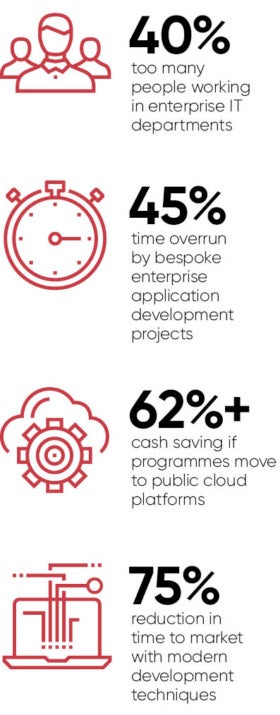 In a field full of giant IT service providers and systems integrators, a young British company, Contino, is offering a nimble and disruptive way of delivering agile and digital transformation.
In a field full of giant IT service providers and systems integrators, a young British company, Contino, is offering a nimble and disruptive way of delivering agile and digital transformation.
What sets Contino apart is how it works with large enterprises and organisations to build capability and skills, not only modernising their software and technology platforms but also their internal processes and culture to be leaner, more vibrant and entrepreneurial.
Co-founder and chief technology officer Benjamin Wootton believes the traditional enterprise structure of outsourcing technology to big providers has created a legacy of slow and bureaucratic processes, which are poorly suited to the modern pace of technological change.
“In many large organisations there is enormous waste and bureaucracy. Our research has shown that IT functions are often up to 40 per cent too large for what they need to achieve. They should instead move towards a smaller pool of more highly skilled people and focus on the applications and digital experiences that differentiate them from the competition,” he says.
“The problem is that the existing model has left many companies without the skills to deliver new digital products and transformational change. They are instead reliant on big legacy contractors that are not equipped to push through change at a rapid pace.”
Technology is developing so ferociously fast that the old model of working – taking one or two years to deliver a large transformation project – has become obsolete.
Contino’s proposition is to focus on delivering transformation through small lighthouse projects that act as a beacon for its capabilities, such as developing new mobile and web applications that can be delivered in short delivery cycles of up to 12 weeks, providing an immediate and tangible benefit for the client business and its customers. These small wins are then multiplied to sow the seed of transformation from the ground up.
The firm employs models such as DevOps, agile software development, continuous delivery, microservice architecture and the adoption of cloud platforms, such as Amazon Web Services, to deliver on these transformation initiatives successfully.
An integral part of Contino’s approach is to encourage and enable cultural change within clients’ organisations, many of which have become risk averse and focused on efficiency and cost-control over speed, agility and innovation. It does this by embedding a small team in the business, and then builds on that by drawing from many different business areas and not just the IT department, in a more cross-functional model.
Contino’s proposition is to focus on delivering transformation through small lighthouse projects that act as a beacon for its capabilities
Mr Wootton says those “blended teams”, made up of IT developers, engineers and testers, as well as people from elsewhere in the business, benefit not just from the expertise of his people but also an environment where the cross-pollination of ideas and entrepreneurial thinking is encouraged.
He explains: “A lot of IT providers want to work remotely from their offshore service centres, but we do almost all our work on site with customers because we are looking to drive cultural change and to stand shoulder to shoulder with them through new process change as well as delivering strategic technology initiatives.”
Although Contino works across a broad spread of industries, including telecoms, media, retail and the public sector, a growing area of focus is regulated industries, particularly financial services such as banking and insurance.
Ben Saunders, head of the firm’s financial services practice, says: “Regulated industries face a number of challenges because they need to move quickly and build better digital experiences, but they are held back by regulatory and heritage technology constraints.
“We can help customers through that by demystifying and making sense of their technology, allowing those monolithic and antiquated IT systems to become more efficient so they can get product to market a lot quicker in the midst of the disruption they face.”

Once seen as the pioneers of technology and exciting places for software engineers to work, banks have been left hamstrung by the financial crisis and saddled with creaking technology stacks.
One of the benefits of a collaborative way of working is it breaks down the inertia that builds up in organisations and shows they can become centres of engineering excellence where a vibrant culture can thrive.
Mr Saunders adds: “Not only does that resonate with staff, but it also makes the brand something people and other organisations want to be associated with, through the value our changes introduce.”
Contino was set up in 2014 by Mr Wootton and Matt Farmer, who spotted a gap in the market after working with large enterprises and seeing how difficult it was to get new applications and features deployed to market.
With $30 million of venture-capital backing, the company quickly established itself a reputation as a trusted partner with large enterprises and it now has offices in London, New York and Melbourne. It has more than 100 digital transformation and engineering specialists, and plans to double in size in 2017.
Mr Farmer says: “There was a huge hunger for an opinionated partner to help clients with agile and digital transformation at scale, and a gap for someone to come together with the high-calibre engineering skills and a new approach to digital transformation focused on capability building.
“We’ve come a long way in a short space of time with what we think is a disruptive model for helping our clients to adopt new tools, techniques and approaches. That’s been proven successful by the take-up across the globe with some very large and admired brands.”
Mr Wootton concludes: “We’re a very mission-driven company. Our motivation is to remove waste and bureaucracy, and taking the tools and approaches startups are leveraging to help enterprise increase delivery speed. These modern approaches are better for our clients, better for their people to work within and ultimately better for the economies in which we work if these famous brands manage to reinvent themselves to be the disruptors instead of the disrupted.”
For more information please visit https://contino.io/


